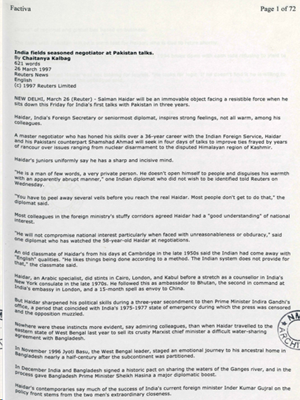India fields seasoned negotiator at Pakistan talks
[Reuters]
Published date: 26th Mar 1997
26 March 1997
Reuters News
English
(c) 1997 Reuters Limited
NEW DELHI, March 26 (Reuter) – Salman Haidar will be an immovable object facing a resistible force when he sits down this Friday for India’s first talks with Pakistan in three years.
Haidar, India’s Foreign Secretary or seniormost diplomat, inspires strong feelings, not all warm, among his colleagues.
A master negotiator who has honed his skills over a 36-year career with the Indian Foreign Service, Haidar and his Pakistani counterpart Shamshad Ahmad will seek in four days of talks to improve ties frayed by years of rancour over issues ranging from nuclear disarmament to the disputed Himalayan region of Kashmir.
Haidar’s juniors uniformly say he has a sharp and incisive mind.
“He is a man of few words, a very private person. He doesn’t open himself to people and disguises his warmth with an apparently abrupt manner,” one Indian diplomat who did not wish to be identified told Reuters on Wednesday.
“You have to peel away several veils before you reach the real Haidar. Most people don’t get to do that,” the diplomat said.
Most colleagues in the foreign ministry’s stuffy corridors agreed Haidar had a “good understanding” of national interest.
“He will not compromise national interest particularly when faced with unreasonableness or obduracy,” said one diplomat who has watched the 58-year-old Haidar at negotiations.
An old classmate of Haidar’s from his days at Cambridge in the late 1950s said the Indian had come away with that,” the classmate said. “English” qualities. “He likes things being done according to a method. The Indian system does not provide for that,”the classmate said.
Haidar, an Arabic specialist, did stints in Cairo, London, and Kabul before a stretch as a counsellor in India’s New York consulate in the late 1970s. He followed this as ambassador to Bhutan, the second in command at India’s embassy in London, and a 15-month spell as envoy to China.
But Haidar sharpened his political skills during a three-year secondment to then Prime Minister Indira Gandhi’s office, a period that coincided with India’s 1975-1977 state of emergency during which the press was censored and the opposition muzzled.
Nowhere were these instincts more evident, say admiring colleagues, than when Haidar travelled to the eastern state of West Bengal last year to sell its crusty Marxist chief minister a difficult water-sharing agreement with Bangladesh.
In November 1996 Jyoti Basu, the West Bengal leader, staged an emotional journey to his ancestral home in Bangladesh nearly a half-century after the subcontinent was partitioned.
In December India and Bangladesh signed a historic pact on sharing the waters of the Ganges river, and in the process gave Bangladesh Prime Minister Sheikh Hasina a major diplomatic boost.
Haidar’s contemporaries say much of the success of India’s current foreign minister Inder Kumar Gujral on the policy front stems from the two men’s extraordinary closeness.
“The two men share a world view and spend a lot of time talking to each other,” one diplomat said.
Gujral, the first widely respected incumbent in the post in three decades, has pushed a theory of “concentric circles” of regional and global ties based on business.
The talks with Pakistan will be a stern test for Haidar, who is due to retire shortly.
The last round of talks between the two sides in January 1994 broke down with each side refusing to yield to the other’s demands.
A colleague warned Haidar was not looking for laurels. “He looks for logic. If he doesn’t find it he is willing to say: ‘Let’s call it a day’,” the colleague said.
(c) Reuters Limited 1997






